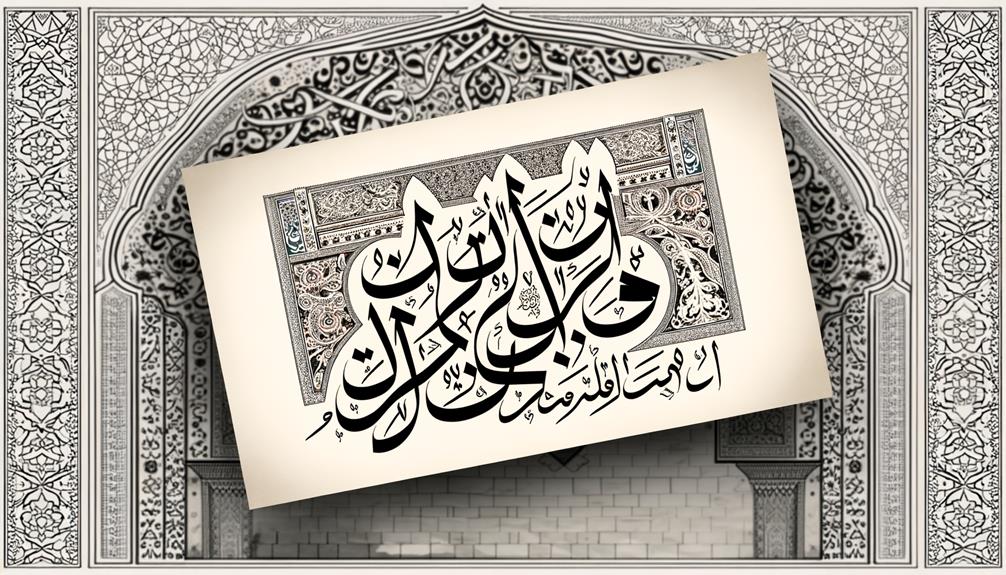Abdul Malik Name Meaning in Urdu
Abdul Malik, written in Urdu as 'عبدالملک', means 'servant of the king.' It originates from Arabic, where 'Abdul' signifies 'servant of' and 'Malik' means 'king' or 'sovereign.' This name reflects deep devotion to Allah, acknowledging Him as the ultimate ruler. It's imbued with cultural reverence, underscoring qualities like leadership, wisdom, and respect.
Throughout history, figures named Abdul Malik have symbolized leadership and piety. Choosing this name connects your child to strong traditions and esteemed values.
By exploring further, you'll uncover intricate layers of its historical and cultural significance.

Key Takeaways
- عبد المالک کا مطلب ہے 'بادشاہ کا خادم'۔
- یہ نام اللہ کی خدمت اور اطاعت کی علامت ہے۔
- عبد المالک اللہ تعالیٰ کی حاکمیت کی قبولیت کا اظہار کرتا ہے۔
- اسلامی تاریخ میں عبد المالک نام والے اہم رہنما اور علماء شامل ہیں۔
- عبد المالک نام قیادت، حکمت، اور احترام کے ساتھ منسلک ہے۔
Origin and Etymology
The name Abdul Malik originates from Arabic, where 'Abdul' means 'servant of' and 'Malik' translates to 'king' or 'sovereign.'
When you hear this name, you're encountering a rich linguistic heritage. In Arabic, names often reflect a deep connection to faith and cultural values. 'Abdul' signifies devotion and servitude, while 'Malik' denotes authority and power.
By combining these elements, the name Abdul Malik conveys a sense of humility before a higher power and acknowledges the majesty of the divine. This etymology isn't just a linguistic construct; it's a profound statement of identity and belief.
Understanding this origin helps you appreciate the depth and significance behind the name, making it more than just a label.
Religious Significance
In Islamic tradition, Abdul Malik holds profound religious significance as it reflects a person's devotion to Allah, recognizing Him as the ultimate sovereign and ruler.
By naming someone Abdul Malik, you're expressing that the individual is a servant of “Al-Malik,” one of Allah's 99 names, which means 'The King.' This title signifies a deep acknowledgment of Allah's supreme authority and governance over all creation.
It's a reminder of the believer's humble status before the Almighty and encourages living a life in accordance with divine will. Embracing this name underscores a commitment to faith, submission, and reverence, making it a spiritually meaningful choice for any Muslim family.
Cultural Importance
Beyond its profound religious significance, Abdul Malik also holds substantial cultural importance in many Muslim communities. When you name a child Abdul Malik, you're embedding a sense of identity and belonging.
The name carries connotations of leadership, wisdom, and respect, often reflecting the qualities that parents hope their child will embody. In many cultures, names are chosen not just for their meaning but for their resonance within the community.
Abdul Malik is frequently chosen to honor familial and societal values, linking individuals to a broader cultural heritage. Through this name, you're fostering a connection to shared traditions and history, ensuring that the child grows up with a strong sense of cultural pride and responsibility.
Historical Context
Rooted deeply in Islamic history, the name Abdul Malik has been bestowed upon many influential leaders and scholars, embodying a legacy of power and intellect. You'll find that this name has graced the annals of history, connecting individuals to a profound heritage. During the Umayyad Caliphate, Abdul Malik ibn Marwan reigned as a formidable caliph, known for his administrative prowess and significant contributions to the Islamic state.
| Historical Figure | Contribution |
|---|---|
| Abdul Malik ibn Marwan | Strengthened central administration |
| Abdul Malik al-Sanusi | Played a key role in the Sanusiya movement |
| Abdul Malik al-Asma'i | Renowned scholar and poet |
Each bearer of this name has added to its rich historical context, making it a symbol of leadership and wisdom.
Modern Usage
Today, the name Abdul Malik continues to resonate with significance, often chosen by parents who wish to imbue their child with a sense of heritage and leadership. It's a name that carries both spiritual and historical weight, reflecting reverence for Islamic tradition.
In modern contexts, Abdul Malik isn't just a name but a tribute to the values and aspirations parents hold for their children. It symbolizes a connection to faith, wisdom, and authority. You'll also find it among professionals, scholars, and community leaders, reinforcing its association with responsibility and respect.
Choosing Abdul Malik is more than a nod to the past; it's a commitment to guiding future generations with the same esteemed qualities.
Conclusion
In understanding the name Abdul Malik, you've explored its origin, etymology, and religious significance. This thorough investigation delves into its cultural importance and historical context, demonstrating how its modern usage still holds relevance.
From faith-filled traditions to contemporary contexts, Abdul Malik stands as a symbol of spiritual strength and steadfastness. Your exploration connects you to a rich tapestry of tradition and timelessness, emphasizing the name's enduring grace and esteemed essence in Urdu and beyond.






